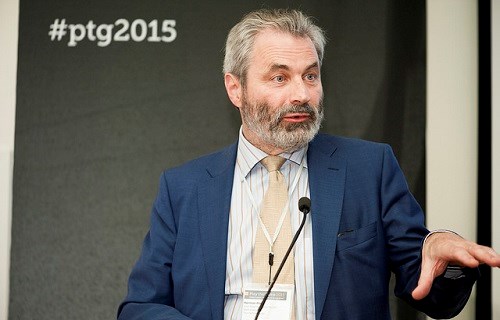An elephant should be eaten one piece at a time

Herman Ram during his presentation. Photo: Thomas Søndergaard/Play the Game
26.10.2015
By Søren BangDespite a massive rule-based framework supporting the anti-doping fight having come into place internationally, with no fewer than 1,260 pages of rules regulating the work through the World Ani-Doping Code and its supplementing regulations, doping is still prevalent in elite sport and the anti-doping work is far from being unchallenged.
Starting by listing some of the successes in the anti-doping efforts since the establishment of WADA and the World Ani-Doping Code in the first half of the noughties, Herman Ram, head of the Dutch anti-doping agency, concluded that the focus must change from creating the necessary rules to a focus on how these are complied with.
“I’ve counted them and we have 1,260 pages of rules in place at this very moment. This is quite a lot. And generally speaking, these are good, strong rules. […] We don’t need more rules in my opinion. What we need to talk about is implementation,” Ram said when the Play the Game conference discussed the present state of the anti-doping fight in a partner session co-organised by the Danish Anti-Doping Agency.
The fact that 182 out of the 195 member states signing the UNESCO convention on doping is, in Ram’s words, “impressive”. However, it is not the same that all the nations are having an efficient, robust and independent national anti-doping organisation (NADO) in place.
“I am not criticising the convention, I’m just stating that it is a limited tool to actually achieve what you want to achieve. It would be naïve to expect that 182 nations in the world would have a strong anti-doping programme, and some cases there are countries where there are problems,” he said mentioning the allegations against Russia for covering up doping among their athletes.
Herman Ram estimated that around 50 NADOs have implemented all the rules. So only a little more than quarter of all countries behind the UNESCO convention actually have an efficient agency in place. The rest do not. Regional anti-doping organisations can fill part of the gap, but not all of it.
According to Ram, the challenges in the coming years will therefore be to make use of the established framework, and to secure proper funding for the work and more knowledge on the effect of the efforts, including more evidence on the prevalence of doping and deterrence effect of the anti-doping work. However, no one should have any illusions that the fight against doping will ever be completely won.
“There is no such thing as a completely clean sport,” he told the audience.
The lack of compliance
In pointing to the lack of compliance in some parts of the world, Herman Ram got support from Richard W. Pound.
After an introduction to the birth of WADA, the IOC member and former president of WADA mentioned the lack of compliance with code in some sports and countries and the fact that this is much more money in sport creating challenges for the anti-doping efforts.
“It is very hard to get any action, and it’s the same within the sports movement. Nobody really wants to pull the trigger. So there has been, in my view at least, an unwillingness to get to the accountability level. We have not really declared anybody in any country or federation non-code-compliant, and all those who think that all international federations are code-compliant, please raise your hands because I have a bridge in Brooklyn that I’d like to try to sell you after this session,” Pound said.
However, the needed changes will require a step-by-step approach, he said in reply to the question of whether the anti-doping agencies should set clearer, and maybe ambitious, targets for their work:
“The way to eat an elephant is one bite at a time and you’re not going to go from zero to the big solution overnight. Because you’ve got to develop consensus in 200 countries with varying levels of commitment. You do little things in the start,” he said and continued:
“We have not maximised what I think we can do. We have done a lot of the teaching and educating. We haven’t said, ‘it’s been 15 years and you haven’t got yourself code-compliant… If you’re not code-compliant, you’re clearly not taking decisions seriously, so until you get that done you’re not going to participate in international sport.’ That’s the next step for me, because if you need the carrot, then you need the stick.”
Combining the work against doping and match-fixing
Jesper Frigast Larsen and Christina Friis Johansen from the Danish anti-doping agency called for more integrated actions against all sorts of sport integrity matters – from doping to match-fixing and corruption.
Recently, the anti-doping legislation in Denmark has been broadened to include match-fixing, and is now a law on sports integrity rather than just doping.
Such a step is reasonable, Jesper Frigast Larsen argued. “We are of the opinion that there is a lot in common between match-fixing and doping,” he said pointing at a number of parallels:
Both can have connections to international crime syndicates, both can be big business. But there is also a need for international and national legislation, cooperation and information exchange in common, the sports organisations cannot do necessary investigations themselves, and athletes are involved as ‘end users’ in both areas.
To Anti Doping Denmark, this raises the question of whether a new international ‘WADA’ dedicated to the fight against match-fixing would be needed in the long run. Or alternatively, if WADA should transformed into a broader sport integrity organisation.





